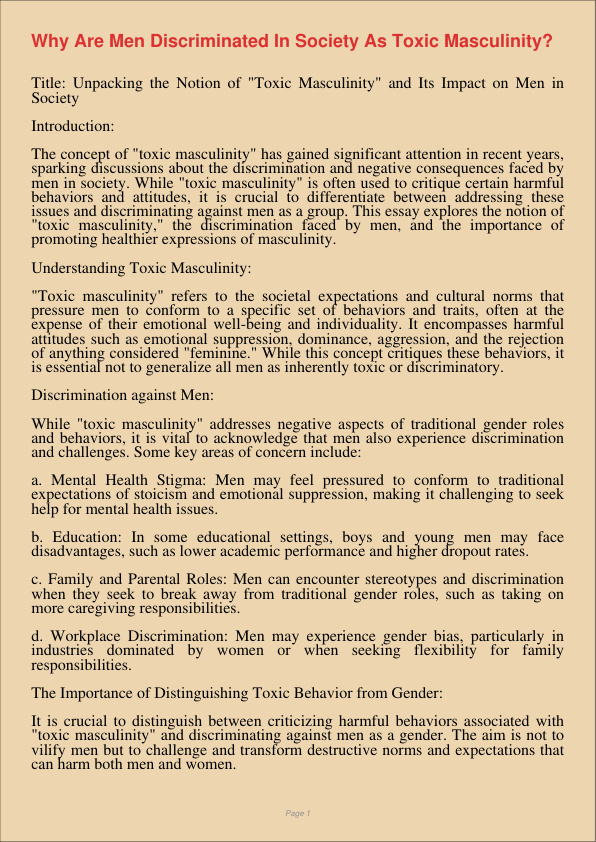
Title: Unpacking the Notion of “Toxic Masculinity” and Its Impact on Men in Society
Introduction:
The concept of “toxic masculinity” has gained significant attention in recent years, sparking discussions about the discrimination and negative consequences faced by men in society. While “toxic masculinity” is often used to critique certain harmful behaviors and attitudes, it is crucial to differentiate between addressing these issues and discriminating against men as a group. This essay explores the notion of “toxic masculinity,” the discrimination faced by men, and the importance of promoting healthier expressions of masculinity.
Understanding Toxic Masculinity:
“Toxic masculinity” refers to the societal expectations and cultural norms that pressure men to conform to a specific set of behaviors and traits, often at the expense of their emotional well-being and individuality. It encompasses harmful attitudes such as emotional suppression, dominance, aggression, and the rejection of anything considered “feminine.” While this concept critiques these behaviors, it is essential not to generalize all men as inherently toxic or discriminatory.
Discrimination against Men:
While “toxic masculinity” addresses negative aspects of traditional gender roles and behaviors, it is vital to acknowledge that men also experience discrimination and challenges. Some key areas of concern include:
a. Mental Health Stigma: Men may feel pressured to conform to traditional expectations of stoicism and emotional suppression, making it challenging to seek help for mental health issues.
b. Education: In some educational settings, boys and young men may face disadvantages, such as lower academic performance and higher dropout rates.
c. Family and Parental Roles: Men can encounter stereotypes and discrimination when they seek to break away from traditional gender roles, such as taking on more caregiving responsibilities.
d. Workplace Discrimination: Men may experience gender bias, particularly in industries dominated by women or when seeking flexibility for family responsibilities.
The Importance of Distinguishing Toxic Behavior from Gender:
It is crucial to distinguish between criticizing harmful behaviors associated with “toxic masculinity” and discriminating against men as a gender. The aim is not to vilify men but to challenge and transform destructive norms and expectations that can harm both men and women.
Promoting Positive Masculinity:
Society should promote positive expressions of masculinity that encourage emotional intelligence, empathy, respect for all genders, and healthy relationships. Men should feel empowered to be themselves, to seek help when needed, and to challenge rigid gender expectations.
Intersectionality and Individuality:
The discrimination faced by men is not uniform but varies based on factors such as race, sexual orientation, class, and more. Acknowledging intersectionality is essential in addressing the diverse experiences of men and dismantling stereotypes.
Conclusion:
The concept of “toxic masculinity” is not an attack on men but rather a critique of harmful societal norms and behaviors that can be detrimental to both men and women. It is crucial to recognize and address the discrimination that men may face while promoting healthier expressions of masculinity. Society benefits from diverse, empathetic, and emotionally intelligent individuals, regardless of their gender, and working towards this goal benefits everyone.
「真诚赞赏,手留余香」
真诚赞赏,手留余香
使用微信扫描二维码完成支付
